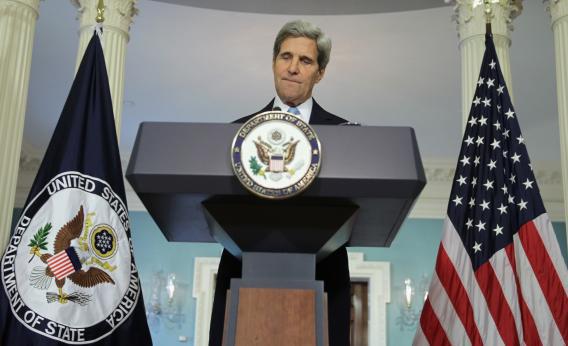With Secretary of State John Kerry laying out the administration’s preliminary case for military action to deter Bashar al-Assad’s chemical weapons use today, a new Reuters/Ipsos poll shows that U.S. public support for such action has increased from the dismal place it was earlier this week, but is still historically low for such an operation.
Only 20 percent of Americans say the U.S. should take action in Syria’s civil war. When asked specifically whether the U.S. should intervene if Assad’s government used chemical weapons, the number increased to 29 percent.
However, an NBC News survey also released today finds that 50 percent of Americans support intervention when told it will be “limited to air strikes using cruise missiles launched from U.S. naval ships that were meant to destroy military units and infrastructure that have been used to carry out chemical attacks.” In this context Kerry’s insistence that “Any action that he might decide to take will be limited and tailored response [sic] to ensure that, a despot’s brutal and flagrant use of chemical weapons is held accountable” makes political sense.
Curiously, the NBC poll showing moderate support for limited airstrikes was accompanied by the finding that only 21 percent of Americans believe military action would be in “our national interest” and only 27 percent believe it would improve the situation in Syria. With the caveat that overall support for this operation is low regardless of other considerations, why would people support even limited action that they don’t believe to be in the U.S. national interest?
A 1992 paper by political scientist Bruce Jentleson may help explain this a bit. Written in the wake of the first Gulf War, the paper aims to describe a new pattern in U.S. public opinion on the use of force that was “less gun shy than during the Vietnam trauma period of the 1970s, but more cautious than during the Cold War consensus of the 1950s and 1960.” The paper examines public opinion on Desert Storm as well as eight 1980s cases: the 1982–84 deployment of Marines to Lebanon, the 1983 invasion of Grenada, the 1986 bombing of Libya, the 1987 naval operations in the Persian Gulf, the 1989 invasion of Panama; as well as the surrogate war strategy of providing aid to anti-communist forces in Nicaragua, El Salvador, and Afghanistan.
What Jentleson found was that public support for these operations was correlated less with whether Americans perceived U.S. interests to be at stake (they didn’t in Panama) or whether the risks was believed to be high (they were in the Gulf War) than with the perceived aims of the operation, specifically whether the operation is aimed at deterring a specific behavior or reshaping political outcomes on the ground. He wrote:
[W]hen the principal objective was to restrain an adversary, when that adversary had gone beyond simply posing a standing threat and initiated aggressive actions against American interests or citizens, the public was prepared to support military action. But when the principal objective was to remake the government of another country, the American public was disinclined to support the use of limited military force, either directly or indirectly.
Give U.S. experience from Vietnam to Afghanistan to Iraq, the public is probably right to be skeptical of the ability of U.S. military force to positively alter political conditions in another country, and Jentleson writes that “Americans do appear to have a much more pragmatic sense of strategy than they are given credit for.”
The polling data on Syria would seem to indicate that what Jentleson called the “pretty prudent public” model is still applicable. The flipside of this is that as long as Americans are convinced a military goal is achievable, they’re less inclined to challenge whether it’s worth achieving or what its unintended consequences may be. Kerry’s speech today was heavy on making the case against Assad’s regime, heavy on emphasizing that U.S. goals in any intervention would be narrowly limited to chemical weapons deterrence, but light on compelling evidence that an intervention would improve conditions on the ground. Nobody really believes we can do that.
